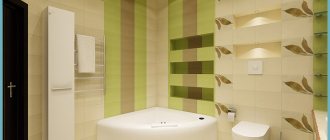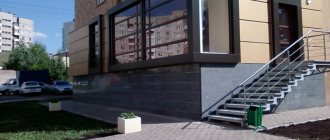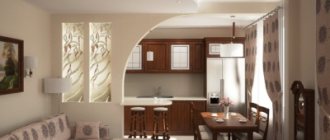What kind of redevelopment is allowed to be legalized?
Not every repair made can be legalized administratively or judicially. Before legalizing the redevelopment, make sure that the changes comply with SNiPs and do not violate the rights of people living nearby.
What you can do in the apartment:
- Move or create new partitions.
- Expand the bathroom at the expense of the corridor or other rooms.
- Combine the kitchen with the living room - but only if the kitchen has an electric stove and not a gas stove.
- Create arches in doorways.
- Change floor coverings and install sound insulation.
Along with permitted works, there is also a list of prohibited ones. You cannot demolish load-bearing walls, move the kitchen into the living room, or enlarge the balcony or loggia at the expense of the bedroom. Such changes cannot be legitimized. Even worse, you can run into trouble in the form of a fine.
Fixing registry error building claim
The most difficult situation to solve may be when the documentary right to the same premises or even building is registered with different persons. In this case, the contradiction may have to be corrected in court.
First you need to figure out what the error is - registration records or cadastral records. For example, an error in the address can lead to the consequences that there will be two objects with different cadastral numbers, but the same address.
Or it is possible that such actions for re-registration may be carried out deliberately for a clearly illegal purpose. For such a case, a special method of protecting rights is provided - recognition of the right as absent, or you need to prepare a statement of claim to correct the registry error.
By the way!! Any cadastral engineer can prepare a technical plan for a property (building, structure, structure) for the purpose of accounting.
Will I be required to pay a fine?
Yes, you will have to pay a fine.
Monetary punishment is imposed for the very fact of redevelopment without the consent of local governments. Even if you made repairs in accordance with all building codes without violations, but forgot to get permission from the administration, you will at least be fined.
The fine for unauthorized redevelopment of premises in an apartment building is from 2,000 to 2,500 rubles (Part 2 of Article 7.21 of the Code of Administrative Offenses of the Russian Federation). The deadline for paying the fine is 60 days from the date of the decision from the supervisory authorities. Until you make the payment, the changes will not be legalized.
A monetary fine is not the worst thing that awaits an apartment owner. The State Housing Inspectorate (GZHI) may oblige you to return the layout to the original version - according to the plan from the BTI.
If you ignore the requirement, the State Property Committee goes to court, which will 99% support this decision. And in case of further neglect from the owner, the living space may be put up for auction, and the offender and his family may be evicted from the apartment.
Thus, in Tyumen, the court resorted to an extreme measure - it decided to sell the owner’s apartment at auction. The defendant brought the water supply and sewerage networks into the living room from the bathroom, and moved the electric stove into the room. The instructions of the Administration were ignored and the violations were not eliminated within the specified time frame (Decision of September 27, 2021 in case No. 2-7388/2017).
How to legalize redevelopment through court
Fine for illegal redevelopment of an apartment
How to legalize an apartment redevelopment that has already been done
Let's consider what to do for an owner who has completed repairs, but has not coordinated the work with the authorized bodies
Where to contact
You can legitimize the redevelopment of the premises that has already been done in several instances:
- Moszhilinspektsiya is the body responsible for the technical condition of housing in Moscow. Now you can contact the Moscow Housing Institute only electronically through the Moscow Mayor's Portal.
- The Department of Architecture and Urban Planning or Housing Inspectorate deals with the coordination and legalization of redevelopment in the regions. Departments of architecture operate under city or district administrations.
- MFC “My Documents” - Centers provide only intermediary services for the transfer of documents from citizens to various departments. To contact the housing inspection, you can contact any MFC.
- Court – considers disputes between citizens and the administration regarding the fact of the redevelopment of the apartment.
There is also a Bureau of Technical Inventory (BTI). But they are not involved in legitimizing the redevelopment. At BTI you can order measurements of an apartment or get a technical passport - nothing more.
Algorithm of actions for the owner
So, you have remodeled your apartment, and now you want to legalize it. Step-by-step procedure:
- Invite an engineer from BTI. An engineer will come to the apartment, record the changes and draw up a report. In it, red lines will be marked on the explication - these are the changes that you did not agree with the administration. Next, the BTI will give you a technical passport with a stamp about the illegal redevelopment of the apartment.
- Get a technical opinion. The full title of the document is “technical report on the admissibility and safety of redevelopment work.” It is done either by a BTI engineer or by specialists from the design bureau. Typically, a technical report is ordered from a private company that is part of the SRO of designers. If load-bearing walls are affected, you need to contact the author of the apartment building rather than the bureau. For example, in Moscow it is JSC MNIITEP.
- Contact the MFC, State Housing Inspectorate or the architecture department.
The owner requests a certificate for a previously completed redevelopment of a premises in an apartment building without approval. A positive or negative response is needed from the department. In the first case, you will be given such a certificate, and in the second, they will refuse with a reason for such a decision. In the regions, it is more convenient to contact the department through the MFC. But for Moscow, the procedure for submitting an application is somewhat different. You need to log in to the Moscow Mayor’s website and submit an application in the electronic service section. - Get a new registration certificate. If the administration gives the go-ahead, contact the BTI and order a new registration certificate. There will no longer be red lines in it (they have been agreed upon).
- Order a technical plan and make changes to the Unified State Register. The final stage will be the preparation of the technical plan on a CD. It is prepared by a cadastral engineer who has permission to work from the SRO. The technical plan is drawn up based on data from the technical passport. Then the information is transmitted through the MFC to Rosreestr. There they will be checked again and issued a cadastral extract from the Unified State Register of Real Estate.
At this point, the legalization of the redevelopment done can be considered complete.
What documents are needed
The applicant must prepare the following documents:
- a written statement addressed to the authorized body;
- technical report from the designer or author of the house;
- registration certificate of the apartment, where the red lines will be marked;
- notarized power of attorney - depending on the situation;
- title documents for residential premises.
A redevelopment project, as in the case of approval of changes, is not needed here. An important role is played by a technical opinion on the admissibility and safety of redevelopment work. That is, it must be shown that the repair does not create additional load on the supporting structures or the walls are reinforced. Without such a conclusion, the administration will not consider the application.
What is the price
Formally, approval of redevelopment is free.
But in the case of legalizing unauthorized changes in the apartment, you will have to fork out for some documents:
- technical report – from 25,000 rubles;
- registration certificate with a visit by a BTI technician - 10,000 rubles, without an engineer visit - 2,400 rubles;
- extracts from the Unified State Register of Real Estate – from 460 rubles;
- notarized power of attorney – from 1,000 rubles.
We add here the cost of paying a fine for illegal redevelopment of an apartment - up to 2,500 rubles. After all, he is being discharged anyway. The total cost of legalizing changes to an apartment can reach 40,000 rubles.
Deadlines
An application for legalization of redevelopment is considered within 45 days. A few more days are needed to send documents from the MFC to the target department - by virtue of clause 4 of Art. 26 Housing Code of the Russian Federation.
In Moscow, legalization of redevelopment takes 30 days or longer.
How is the Bureau of Technical Inventory related to residential remodeling?
Redevelopment of an apartment is usually called such changes that affected the configuration of the premises, included in the technical passport of the living space.
The purpose of the residential property remains the same, but the size of the usable area may change, for example, when demolishing the wall of the pantry and increasing the room due to it. Redevelopment may not affect the living space in any way, but can be expressed in moving/increasing/decreasing door or window openings, changing the course of communication lines, and much more.
Regardless of the volume of changes made, they must be agreed upon and included in the technical plan .
This procedure is carried out with the assistance of the BTI. It will not be possible to enter data without contacting this authority. The Bureau of Technical Inventory (BTI) is a government organization that maintains a file cabinet of all real estate in the country. The structure includes a staff of specialists at different levels who are involved in developing redevelopment projects, checking what has been completed, and changing the technical characteristics of the living space.
Cataloging of current data allows you to obtain complete information about an object at any time. Extracts and certificates are provided based on the available information. Systematic accounting eliminates errors and inaccuracies when buying and selling an apartment or carrying out other operations with it.
Legalization of unauthorized redevelopment of an apartment through the court
Not in all regions of Russia the procedure for legitimizing completed redevelopments has been perfected to the point of automaticity.
For example, in Moscow you can legalize repairs upon application to the Moscow Housing Institute. But in the Moscow region this procedure no longer applies. Local authorities immediately issue a refusal and advise you to go to court. How to proceed through the court - step-by-step instructions:
- Calling an engineer from BTI. The beginning is standard - you go to the BTI office, submit an application to call a technician, he comes to the apartment and records the changes that were not made to the technical records. Next, you are given a new apartment passport (with a stamp about illegal redevelopment).
- Contact the administration. The applicant must contact the MFC or directly the department to submit an application and documents. In Moscow, the application will be considered, and in other regions it will be sent to court.
- Going to court.
The statement of claim is filed with the district court at the location of the property. Documents can be sent by mail, transmitted through a representative, uploaded on the State Automated System “Justice” website, or taken to court yourself. The court examines the technical conclusion, and if doubt arises, it may order a new construction and technical examination. The task is to evaluate changes in the layout and compare them with SNiP standards. The services of experts are paid, they are paid by the plaintiff. - Winning the case. After the court resolves the dispute, it announces the operative part. Next, the parties are sent a reasoned court decision. If it is in your favor, all that remains is to receive a certificate of completed redevelopment.
- Obtaining a new technical passport. The updated layout must be taken into account in the BTI. To do this, you need to contact the Bureau again and invite a technician. It will fix the final configuration of the living space. As a result, you will receive a new registration certificate.
- Cadastral registration. Based on the technical passport, an apartment plan is prepared. It is needed to make changes to the Unified Real Estate Register, since the total and living area of the apartment is changing. The application can be submitted at the nearest MFC, and upon completion of the service, you will be given a cadastral extract from the Unified State Register of Real Estate.
Note! If the court's decision is not in your favor, then, most likely, you will be obliged to return the apartment to its original layout. But you have the opportunity to appeal the court decision to a higher authority - in the regional or regional court. And so on all the way to the Supreme Court of the Russian Federation.
Claim to preserve the apartment in a redesigned state
Sample claim
Documentation
The plaintiff prepares the same documents as for the administrative procedure for approving redevelopment (except for the project). In addition, they are accompanied by a refusal from the architecture department or housing inspection, depending on the region. The plaintiff also has the right to petition the court to request missing documents.
How much does it cost to prepare documents when the cost is higher?
Before assessing the future costs of processing documentation at the Bureau of Technical Inventory, it should be clarified that there are two options for legalizing redevelopment:
- Legal . The homeowner wants to change the configuration and addresses this issue to the BTI. There they draw up a future plan for him, specify materials for construction and other issues, and give him the go-ahead to carry out the work.
- Through the court . The owner first carried out the reconstruction of the living space, and only then decided to include it in the documents. This is a more complex and, as a result, expensive procedure.
Important . Acting according to the law is always easier, cheaper and faster. In addition, we should not forget that not any changes already made will be legitimized. Such a turn threatens the need to return housing to its previous appearance, but more on that later.
Any scenario requires material costs, but what the final price will be depends on whether the owner will resort to the services of intermediaries. Today there are many companies on the market that help make the necessary changes quickly and without hassle. Prices for their services vary over a very wide range and directly depend on the city where the living space is located.
When preparing the document yourself and applying to the BTI, you must pay for:
- registration certificate – from 900 rubles;
- cadastral passport – from 200 rubles;
- preparation of a redevelopment project from 4,000 rubles and above.
If we are talking about legalization through the court, then you should take into account the state fee for considering the claim, legal services and much more. It will not be possible to calculate the exact cost in advance. Often, turning to paid services is not much more expensive than doing the procedure yourself, especially when you take into account the time savings.
Arbitrage practice
It is distinguished by diversity in terms of decisions taken by the courts. Some plaintiffs are allowed to keep the apartment changes, while others are denied.
A positive court decision will be made if the examination establishes that:
- the supporting structures are not damaged and are able to withstand the new load;
- the repair complies with SanPiN, SNiP, fire safety, environmental requirements and other regulations of local governments;
- there is no threat to the life and health of people (owners, neighbors);
- The living space is fully suitable for living.
Four factors are taken into account at once, and not each of them separately.
An example from judicial practice. In Novosibirsk, the owners did not coordinate the work with the local government, and therefore were forced to ask the court to leave the planning changes in their current state. The court ordered a construction and technical examination. She determined that the owners had made a new opening in the existing wall of the house between two living rooms (with reinforcement of the load-bearing wall). The wooden partition with the doorway between the corridor and the bathroom was also dismantled. The new partition turned out to be more powerful - it was built from brick. Risers, sewerage, ventilation and elevator shafts were not affected. The experts did not notice any defects, cracks or deflections of the structures. There was also no threat to human life or health. In addition, the plaintiff previously provided a technical report - which recorded compliance with all standards.
As a final decision, the court allowed the owner to keep the apartment in a redesigned state.
(Decision of the Zheleznodorozhny District Court of Novosibirsk dated July 30, 2021 in case No. 2-179/2020).
Lawyer's answers to private questions
Is it necessary to obtain the consent of all owners of the house in case of legalizing the redevelopment of an apartment?
If you do not affect the vestibule, staircase, elevator shaft, building facade and other common property of the house, the consent of the residents of the house is not required. In other cases, it is necessary to put the issue on the agenda and collect votes. Theoretically this can be done, but in practice it is quite difficult.
I plan to file a claim to preserve the apartment in its redesigned state. Is it necessary to file a claim from both owners if the living space is shared ownership?
Yes, in this case there are two plaintiffs. But you can do the following: indicate in the claim the full names and addresses of both owners, but at the court hearing there will be one plaintiff - who will represent the interests of both. For this you need a notarized power of attorney. In addition, you can submit an application to consider the case in the absence of the plaintiff and send him a copy of the court decision (Article 167 of the Code of Civil Procedure of the Russian Federation). Here you need to indicate a good reason (for example, being on a business trip or serious illness). But in this case, you are less likely to count on a positive court decision. It is better to attend in person or delegate authority to a representative.
Is it possible to legalize the redevelopment of an apartment in a dilapidated building for demolition?
No, no one will approve of redevelopment in dilapidated buildings, either before or after renovation. Any impact on the supporting structures in a dilapidated house is fraught with their collapse. There is a direct threat to the life and health of people.









